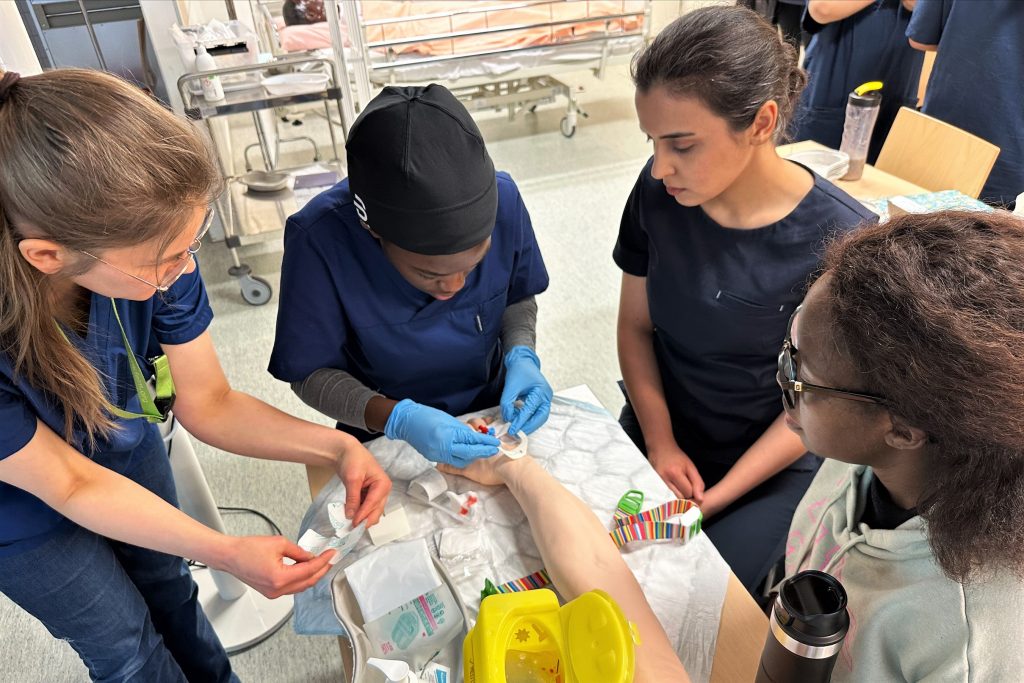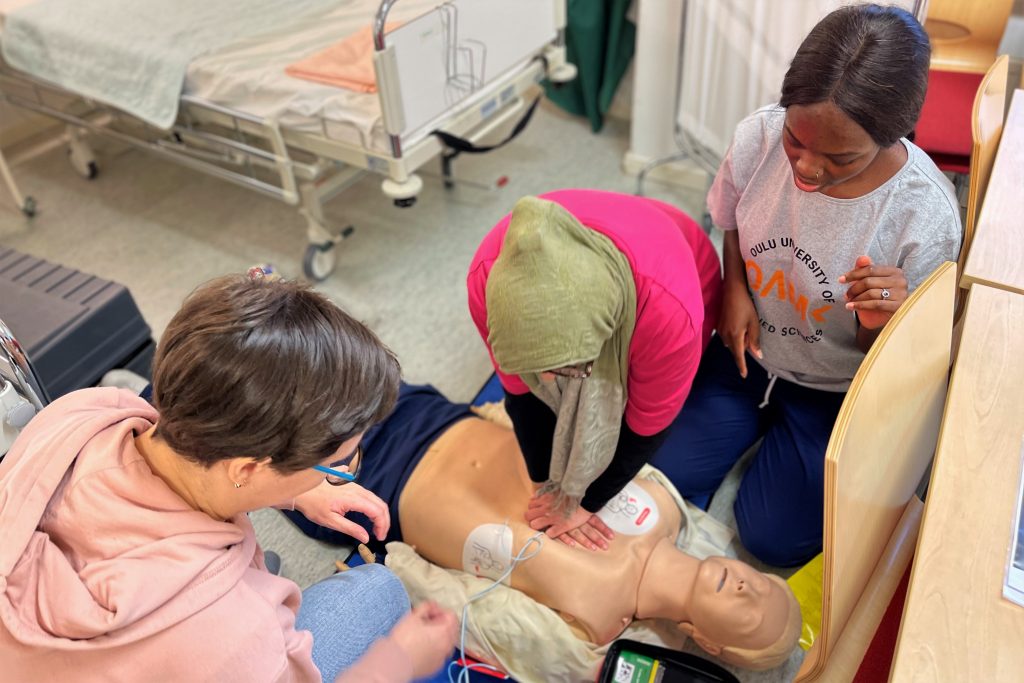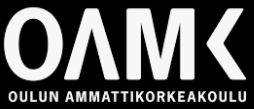The Bachelor of Health Care, Degree Programme in Nursing is an international degree programme offered at Oulu University of Applied Sciences (Oamk). The changing dynamics of the social and healthcare systems in the global society empower nurses of the contemporary world to become skilful, independent, and competitive. As Finnish healthcare is becoming multicultural, establishing a degree programme in the English language will increase internationalisation within the region and ensure multicultural skills are in place among future nurses. The international nursing education curriculum in Northern Ostrobothnia aims to address the needs of the Finnish and global health society and strengthen collaboration with different stakeholders in the education and employment sectors. The structure of the nursing curriculum incorporates sustainability across the different stages of studies in order to prepare the students with the changing global health needs.

The Degree Programme in Nursing at Oamk is an answer to the call of the global nursing leaders to address the critical shortage of nursing. The achievement of Universal Health Coverage (UHC) and Sustainable Development Goals (SDGs) depends on nurses which are considered the largest healthcare professionals. Nursing education experts with didactic experience in primary health and specialised medical care thoroughly assess the nursing curriculum so that future generations of nurses produced can cope with the changing needs of the modern world such as the importance of patient-based outcomes, digitalisation, and international cooperation.
The nursing curriculum is comprised of three levels to fulfil the competencies of nurses needed in working life. The levels are interlinked to the four fundamental responsibilities of the International Council of Nursing to promote health, prevent illness, restore health, and alleviate suffering [1]. At each level, students are evaluated in a multi-modal approach. The concepts of multidisciplinary teamwork, evidence-based practice, sustainability, and digitalisation are emphasised to assist nursing students in their learning process.
The Bachelor of Healthcare at Oamk aims to be the forefront programme in emphasising the value of multiculturalism in society and increasing the receptivity of health care in Northern Ostrobothnia for the nursing workforce of foreign backgrounds. As part of the Oamk’s strategic core values, the organization is committed to achieving the sustainable development goals. As a result, sustainable nursing practice is emphasized as the key value in the nursing curriculum.
Critical nursing shortage in Finland
By 2035 and beyond, the country needs 200 000 new employees in the social and healthcare field and 10 percent of this will be recruited overseas which is around 20 000 [2] [3]. Finland’s population is progressively ageing and the country is living in a historical epoch with four contemporaneous generations [4].
The implication of increasing the nursing workforce with the aid of foreign nurses remains a timely discussion in Finnish society. As Finland suffers from a critical shortage of nursing, the country needs to reflect on changing its national strategies and policies to align with the needs of foreign nurses who want to migrate to Finland without experiencing rigorous obstacles in the qualification and credentialing system. It is essential to first educate those foreigners who are already in the country and willing to work in the nursing sector.
Although patient safety will remain to be the critical basis in the decision in creating national guidelines for regulating healthcare professionals in the country, legislators and decision-makers need to accommodate the needs of those internationally educated nurses without nursing qualifications in the country who can be utilized to address the issue of nursing staff shortage both in the primary healthcare and specialised medical care services. Educating foreigners about sustainability in health care practices require multidisciplinary approach in teaching.
Three interdependent levels to increase awareness in sustainability
The Degree Programme in Nursing Curriculum has three interdependent levels which incorporates sustainability. The competencies of the nursing students are assessed in a multi-modal approach. The competencies are based on the 10 domains of professional competence in nursing issued by the Finnish Ministry of Education and Culture: 1) ethical activity, 2) health promotion, 3) decision-making in nursing, 4) patient education, 5) collaboration, 6) research and development work and leadership, 7) multicultural nursing, 8) social activity, 9) clinical nursing and 10) medical care [5].

These competencies are incorporated to the concept of sustainability in both theoretical and clinical practices. At each level, students are required to show their competencies by considering sustainable actions with their colleagues, patients and working environments.
The three levels of learning for basic and professional studies in nursing at Oamk are outlined as follows (table 1).
| Bachelor of Health | Care-Degree Programme in Nursing | |
|---|---|---|
| Degree Level | Main Content | Description |
| Level I | Foundations of Professional Nursing | Foundations of Professional Nursing (FPN) studies equip nursing students with the primary nursing skills essential to patients’ vital functions and activities of daily living needed by nurses in everyday work life. |
| Level II | Preventive, Curative, and Rehabilitative Nursing | Preventing, Curative and Rehabilitative Nursing (PCRN) constitutes the core learning outcomes for professional nursing. Nursing students undergo intensive theoretical and high-fidelity simulation training in various case scenarios. |
| Level III | Advanced and Specialised Nursing Care | Nursing students deepen their skills, knowledge, and competencies in their chosen field of specialisation. Working in a multidisciplinary team, communication, leadership and clinical judgment skills in nursing will be emphasised in preparing nurses for professional work life. Before graduation, nursing students will be required to produce a thesis meeting the European Qualification Framework (EQF) Level 6 equivalent to a bachelor’s level. |
Application of sustainability in the clinical practicum
In clinical practicums, students are given the opportunity to apply their theoretical knowledge into practice and prepare them for professional work life. The competencies of a general nurse responsible for care are tested in the clinical field from various levels of primary health care and specialised medical care facilities. In this way, sustainability is the key value in their actions and their theoretical understanding of sustainability is applied into practice.
The clinical practicum is also divided into two main categories and three sub-categories (table 2). The two main categories include the Clinical Practicum in Fundamentals of Nursing Care and the Clinical Practicum in Advanced Nursing Care which are the first and last practicums to be done by nursing students. Between the second and third years of studies, clinical practicums in specialised medical care, vulnerable populations, and person-centered care are mandatory to be passed. To be qualified as a Registered Nurse, all the clinical practicums with a total number of 75 credits must be completed without deficits.
| Clinical Practicum (75 ECTS) | ||
|---|---|---|
| Clinical Practicum in Fundamentals of Nursing Care (7 ECTS) | ||
| Clinical Practicum in Specialised Medical Care | Clinical Practicum with the Vulnerable Populations | Clinical Practicum in Person-Centered Care |
| – Clinical Practicum in Medical Nursing (6 ECTS) – Clinical Practicum in Perioperative Nursing (6 ECTS) | – Clinical Practicum in Mental Health and Addiction Nursing (6 ECTS) – Clinical Practicum in Family-Centered Care in Pediatric Nursing (6 ECTS) – Clinical Practicum in Women’s Health (6 ECTS) | – Clinical Practicum in Gerontological Nursing (7 ECTS) – Clinical Practicum in Person-Centered Ambulatory Care (7 ECTS) |
| Clinical Practicum in Advanced Nursing Care (20 ECTS) |
Strengthening understanding about sustainability through free-choice studies
Free-choice studies can be completed at university-level studies that are not compulsory in the students’ curriculum and that support the development of expertise for a future degree. Studies in other degree programs (considering possible prerequisites and timings), other university studies, and international studies can also be submitted as studies. These studies integrate the principles of sustainability and focus on how the UN SDGs can be better achieved.
The following elective courses are offered at Oulu University of Applied Sciences in the English language. These courses address the issues corresponding to the needs of the nursing profession locally and internationally. All courses are 5 ECTS.
- Nursing in International and Global Health. Nurses’ role during emergencies and disaster preparedness, universal health coverage, nursing workforce, governance, and leadership.
- eHealth and Digital Solutions in Health Care. Digital health skills and solutions in the nursing profession.
- Patient Safety for Future Health Professionals. Understand factors affecting patient safety and its corresponding policies.
- Sustainable Nursing Practice. Leadership and nursing practices to advance sustainability in health care including the participation of nurses in solving the climate change crisis.
Conclusion
The pilot programme of the Degree Programme in Nursing (DPN) strengthens the presence of foreign nursing students in social and healthcare services. As Finland experiences a critical nursing shortage during the Covid19 pandemic, the relevance of internationalising nursing education in Finland by offering programmes in the English language will give opportunities for foreigners to be part of the working society. In the future, the country will become dependent on the foreign nursing workforce thus the education system needs to be dynamic to the changing needs of society. Global health challenges are taken seriously, and future Registered Nurses need to adopt sustainable practices in health care.
The three levels of the nursing curriculum will prevent backlogs of studies by instituting prerequisites to ensure that the competencies imposed by the legislation will be followed with confidence. Furthermore, free-choice studies will give freedom to students to select courses according to the trend in nursing in the global health arena by ensuring that they are equipped with the competencies necessary for professional development.
Floro Cubelo
Senior Lecturer, Head of the Degree Programme in Nursing
Oulu University of Applied Sciences, School of Health and Social Care
Markus Karttunen
Head of the Education
Oulu University of Applied Sciences, School of Health and Social Care
References
[1] International Council of Nurses. 2021. The ICN Code of Ethics for Nurses. Retrieved 1.12.2022. https://www.icn.ch/system/files/2021-10/ICN_Code-of-Ethics_EN_Web_0.pdf
[2] Parliament of Finland. 2022. Hallituksen esitys eduskunnalle laiksi ulkomaalaislain muuttamisesta ja siihen liittyviksi laeiksi. HE 114/2022 vp. Retrieved 1.12.2022. https://www.eduskunta.fi/FI/vaski/HallituksenEsitys/Sivut/HE_114+2022.aspx
[3] Yle News. 2022. STT: Finland needs 20,000 foreign health and social care workers, but few have arrived lately. Yle News 27.11.2022. Retrieved 30.11.2022. https://yle.fi/a/3-12681978
[4] Kajander-Unkuri, S. 2014. Nurse competence of graduating nursing students. Doctoral Dissertation. University of Turku. Retrieved 13.1.2023. https://urn.fi/URN:ISBN:978-951-29-6003-3
[5] Terveyden ja hyvinvoinnin laitos. 2011. Ageing policy. Finnish Institute for Health and Welfare (THL), Finland. Topic. Retrieved 13.12.2022. https://thl.fi/en/web/ageing/ageing-policy

Vastaa
Sinun täytyy kirjautua sisään kommentoidaksesi.